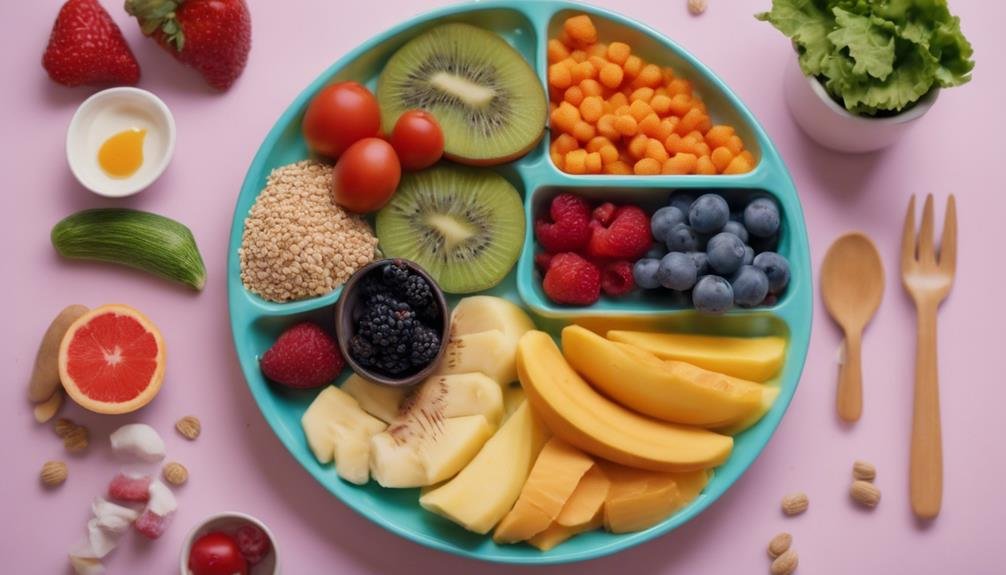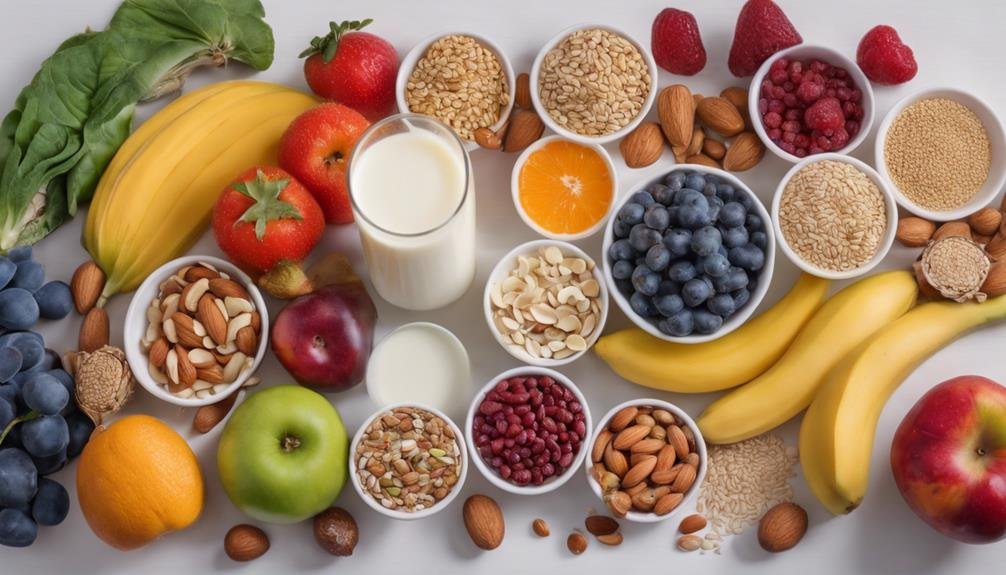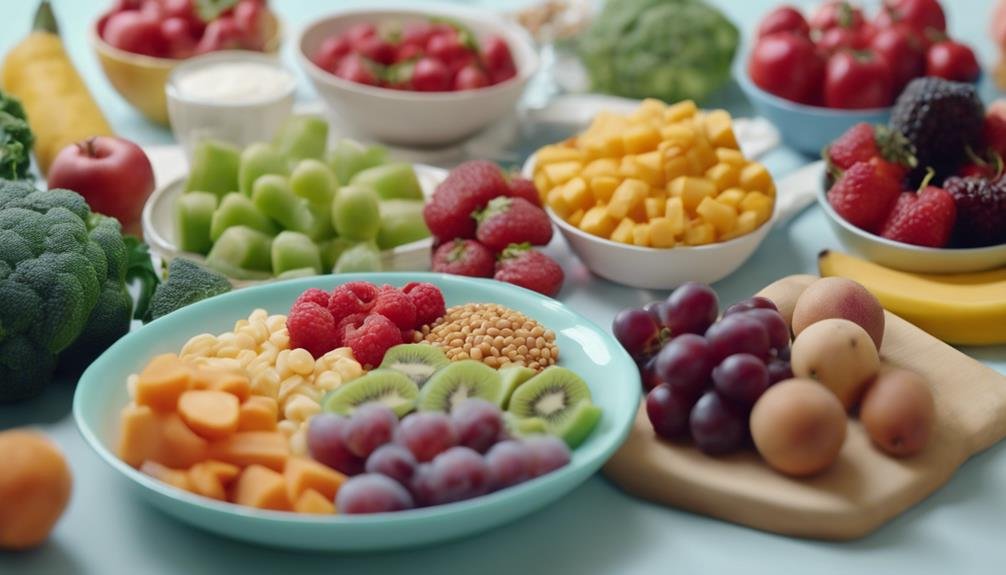"Cherishing Little Steps - A Haven for Baby and Family Journeys"
The Ultimate Guide to Toddler Nutrition: What Every Parent Needs to Know
As a parent, navigating the world of toddler nutrition can be both rewarding and challenging. Understanding the essential nutrients your child needs is just the beginning of this journey. But what about the common pitfalls many parents face when trying to ensure their little ones are getting the right nutrition? Stay tuned to discover practical tips and expert advice that will help you navigate this crucial aspect of parenting with confidence and ease. Your child's health and well-being are worth the investment of your time and attention.
Key Takeaways
- Provide a balanced diet rich in essential nutrients for toddler development.
- Balance macronutrients like carbohydrates, proteins, and fats for health.
- Ensure intake of vitamins and minerals crucial for growth and development.
- Offer healthy snack options to maintain energy levels and support growth.
- Deal with picky eaters by involving them in meal planning and offering variety.
Toddler Nutritional Needs

To ensure your toddler grows and thrives, it's crucial to understand their specific nutritional needs during this critical stage of development. Toddlers require a balanced diet rich in essential nutrients to support their rapid growth and development. One key aspect is ensuring an adequate intake of vitamins and minerals. Foods like fruits, vegetables, whole grains, and lean proteins can provide these vital nutrients.
Iron is especially important for toddlers as it helps with brain development and overall growth. Incorporating iron-rich foods like lean meats, beans, and fortified cereals can help meet this need.
Additionally, toddlers need a steady intake of healthy fats for brain development and energy. Foods like avocados, nuts, and oily fish are excellent sources of these essential fats.
It's also important to introduce a variety of foods to expand your toddler's palate and ensure they receive a wide range of nutrients. Remember, each child is unique, so observing how your toddler responds to different foods can help tailor their diet to suit their individual needs.
Balancing Macronutrients
Achieving a balance of macronutrients in your toddler's diet is essential for their overall health and development. Macronutrients include carbohydrates, proteins, and fats, all of which play crucial roles in providing energy, building tissues, and supporting various bodily functions.
To ensure your toddler gets the right mix of these macronutrients, aim for a diet that includes a variety of foods such as fruits, vegetables, whole grains, lean proteins, and healthy fats.
Carbohydrates are a primary source of energy, so incorporating whole grains like whole wheat bread, brown rice, and oats can provide sustained energy for your little one. Proteins are vital for growth and development, so include sources like lean meats, poultry, fish, eggs, legumes, and dairy products. Healthy fats, found in foods like avocados, nuts, seeds, and olive oil, are important for brain development and overall health.
Essential Vitamins and Minerals

For your toddler's optimal health and growth, ensuring they receive essential vitamins and minerals is key to supporting their overall well-being. These nutrients play a crucial role in your child's development, helping with everything from strong bones and teeth to a robust immune system.
Vitamin D is vital for calcium absorption, while iron supports healthy blood and brain function. Vitamin C boosts their immune system, and zinc aids in growth and development.
To ensure your toddler gets these essential vitamins and minerals, offer a variety of nutrient-rich foods. Include fruits like oranges and strawberries for vitamin C, leafy greens and legumes for iron, and dairy or fortified cereals for calcium and vitamin D. A balanced diet with a mix of fruits, vegetables, whole grains, proteins, and dairy will help cover all their nutritional needs.
Healthy Snack Ideas
Ensuring your toddler has access to nutritious and satisfying snack options is essential for maintaining their energy levels and supporting their growth and development. Opt for snacks that combine carbohydrates for quick energy, protein for sustained fullness, and healthy fats for brain development. Some great options include apple slices with nut butter, Greek yogurt with a sprinkle of granola, or whole grain crackers with cheese. These snacks provide a balance of nutrients that will keep your little one satisfied between meals.
Fresh fruits like berries, banana, or sliced peaches are also excellent choices. They provide natural sweetness and essential vitamins. For a fun twist, try freezing grapes or blending fruits into a smoothie for a refreshing treat. Vegetables like carrot sticks, cucumber slices, or bell pepper strips paired with hummus can introduce your toddler to different flavors and textures while offering important vitamins and minerals.
Remember to keep portions appropriate for your toddler's age and size, and always supervise them while eating to prevent choking hazards. By offering a variety of healthy snack options, you can help your toddler develop good eating habits early on.
Dealing With Picky Eaters

When dealing with picky eaters, it's common to encounter challenges in ensuring they get the nutrition they need while maintaining mealtime harmony. It can be frustrating when your little one refuses to eat anything green or only wants to eat the same foods over and over. Rest assured, you're not alone in this struggle. Here are some practical tips to help navigate this tricky terrain.
Firstly, involve your child in meal planning and preparation. Kids are more likely to eat something they helped create. Keep offering a variety of foods, even if they've been rejected before. It may take multiple exposures for a child to accept a new food. Be patient and persistent.
Try not to turn mealtime into a battleground. Pressuring or forcing a child to eat can lead to negative associations with food. Instead, offer choices within healthy options. Remember, toddlers' appetites can vary greatly from day to day, so trust their internal cues. And finally, lead by example; children are more likely to try new foods if they see you enjoying them too.
Frequently Asked Questions
How Can I Handle My Toddler's Food Allergies?
Handling your toddler's food allergies involves vigilance. Always read labels, communicate clearly with caregivers, and have an action plan in place. Consult with a pediatrician or allergist for guidance on safe food alternatives and emergency protocols.
Are Organic Foods Necessary for Toddlers?
You don't have to buy only organic for toddlers, but choosing some organic options can reduce exposure to pesticides. Fruits like apples, strawberries, and spinach are good choices to prioritize when considering organic.
Should I Give My Toddler Supplements?
You should consult your pediatrician before giving your toddler supplements. Some toddlers may benefit from supplements if they have specific deficiencies, but it's important to get professional advice to ensure they are safe and necessary.
What Drinks Are Best for Toddlers Besides Water?
When considering drinks for your toddler, opt for milk, especially whole milk for children under 2 years old. Limit fruit juice to 4 ounces a day, choosing water as the primary beverage. Ensure drinks offer essential nutrients for growth.
How Can I Encourage My Toddler to Try New Foods?
Encouraging your toddler to try new foods can be fun and rewarding. Offer a variety of colorful and appealing options, involve them in meal prep, and be a positive role model by enjoying a diverse diet together.
Conclusion
So, there you have it – the ultimate guide to toddler nutrition. Remember, dealing with picky eaters can be a challenge, but with patience and persistence, you can help your child develop healthy eating habits.
By offering a variety of nutrient-rich foods and engaging them in meal planning, you can ensure they get the essential vitamins, minerals, and macronutrients they need for optimal growth and development.
Keep up the good work, parents!



I do believe all the ideas youve presented for your post They are really convincing and will certainly work Nonetheless the posts are too short for novices May just you please lengthen them a little from subsequent time Thanks for the post